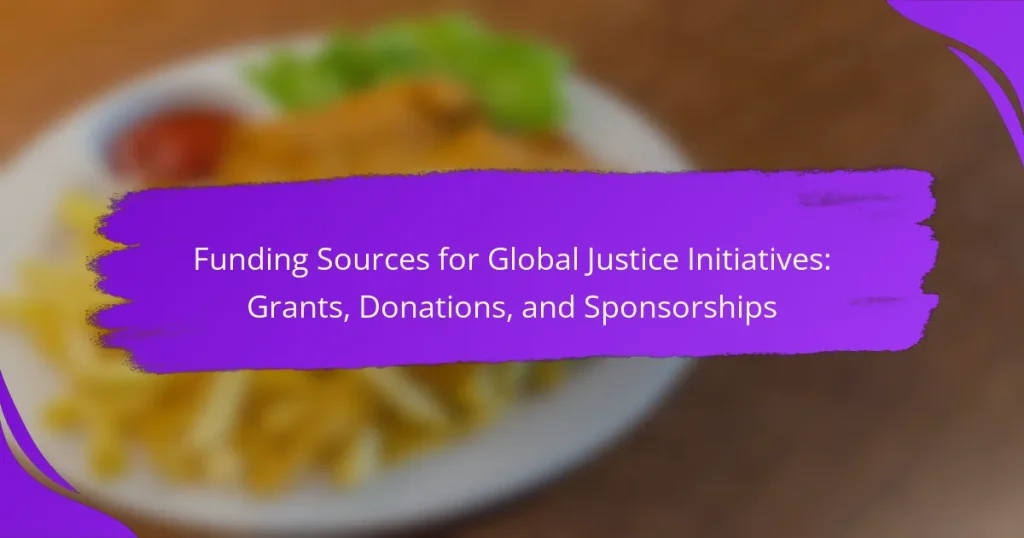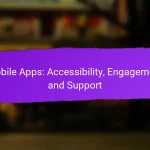Funding sources for global justice initiatives play a crucial role in advancing social equity and human rights. Organizations can tap into grants, private donations, and corporate sponsorships, each offering distinct advantages and challenges. By understanding these funding avenues and employing strategic approaches, organizations can enhance their chances of securing the necessary resources to support their vital work.
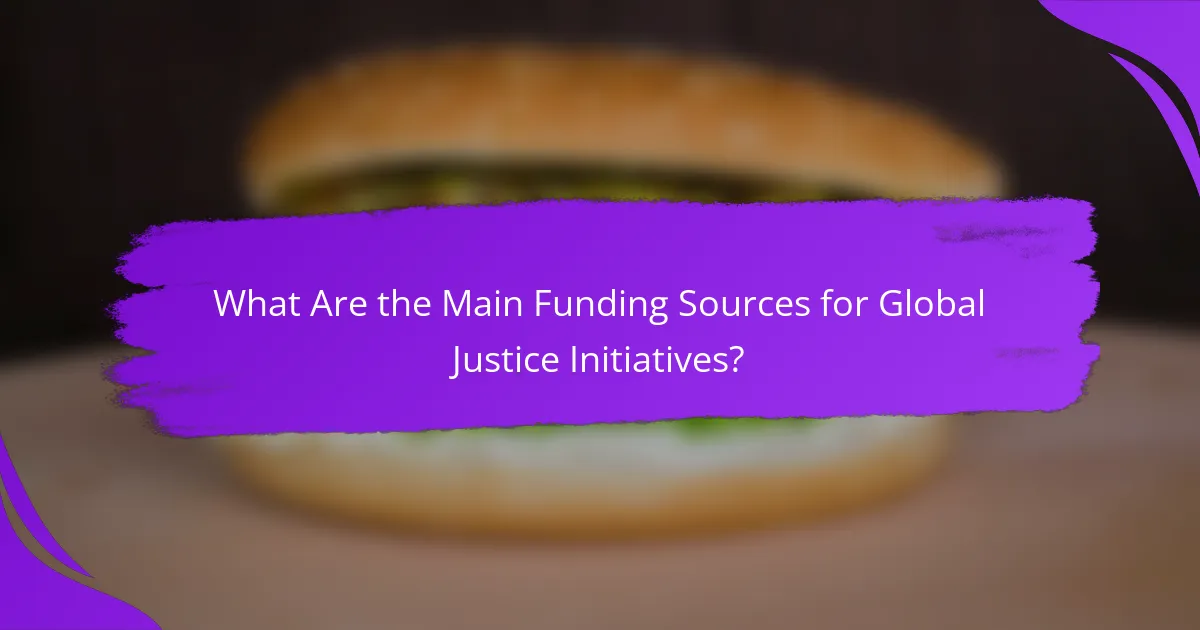
What Are the Main Funding Sources for Global Justice Initiatives?
The primary funding sources for global justice initiatives include grants, private donations, corporate sponsorships, international organization funding, and contributions from nonprofit foundations. Each source has unique characteristics, advantages, and challenges that organizations must navigate to secure necessary resources.
Grants from Government Agencies
Government agencies often provide grants to support global justice initiatives, which can range from local projects to international programs. These grants typically require a detailed proposal outlining the project’s objectives, budget, and expected outcomes.
Organizations should be aware of the eligibility criteria and application deadlines for each grant. It’s advisable to focus on grants that align closely with the organization’s mission to increase the chances of approval.
Private Donations from Individuals
Private donations from individuals can be a significant source of funding for global justice initiatives. These contributions can vary widely in size, from small monthly donations to substantial one-time gifts.
To attract individual donors, organizations should build strong relationships and communicate their impact effectively. Utilizing social media and crowdfunding platforms can also enhance outreach and engagement with potential supporters.
Corporate Sponsorships
Corporate sponsorships involve partnerships where businesses provide financial support in exchange for brand visibility and positive association with social causes. This type of funding can be beneficial for both parties, as it enhances the corporation’s corporate social responsibility profile while providing essential resources for initiatives.
Organizations should approach companies that align with their values and mission. Clear proposals outlining the benefits of sponsorship can help in securing these partnerships.
International Organizations Funding
International organizations, such as the United Nations and various NGOs, often provide funding for global justice initiatives aimed at addressing human rights, development, and humanitarian issues. These funds can support a range of activities, from research to direct action projects.
Applying for funding from these organizations usually requires adherence to specific guidelines and reporting standards. Organizations should ensure they meet these requirements to successfully access these funds.
Nonprofit Foundations Contributions
Nonprofit foundations are dedicated to funding initiatives that align with their mission, often focusing on specific areas such as education, health, or social justice. These contributions can be crucial for organizations seeking to implement or expand their projects.
To secure funding from foundations, organizations should research potential funders thoroughly and tailor their proposals to reflect the foundation’s priorities. Building relationships with foundation staff can also enhance the likelihood of receiving support.
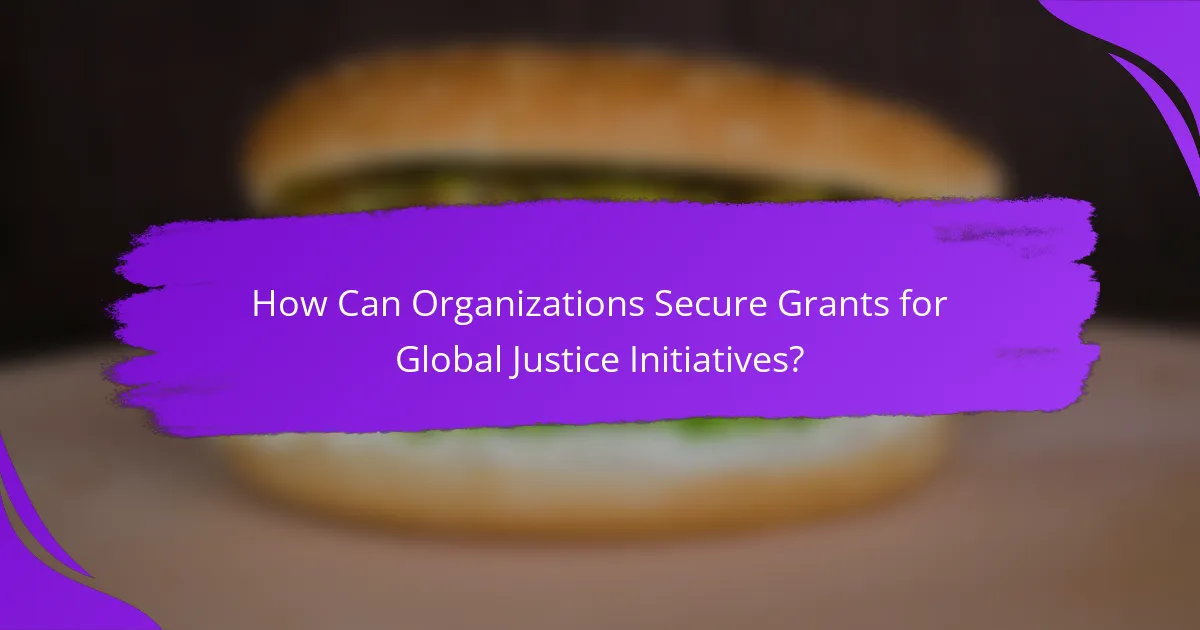
How Can Organizations Secure Grants for Global Justice Initiatives?
Organizations can secure grants for global justice initiatives by identifying suitable funding sources, crafting compelling proposals, and fostering relationships with grantors. These steps are crucial for increasing the likelihood of obtaining financial support for their projects.
Identify Relevant Grant Opportunities
Finding the right grant opportunities is essential for organizations focused on global justice. Start by researching foundations, government programs, and international organizations that align with your mission. Utilize online databases and grant directories to streamline your search.
Consider focusing on grants that specifically target issues like human rights, environmental justice, or social equity. This targeted approach increases the chances of receiving funding, as grantors prefer to support initiatives that resonate with their goals.
Develop a Strong Proposal
A strong proposal is critical for securing grants. Clearly outline your project’s objectives, methodology, and expected outcomes. Use data and case studies to support your claims and demonstrate the potential impact of your initiative.
Ensure your proposal adheres to the specific guidelines set by the grantor, including formatting, length, and required documentation. Tailoring your proposal to each opportunity can significantly enhance your chances of success.
Build Relationships with Grantors
Establishing relationships with grantors can provide valuable insights and increase your chances of funding. Attend networking events, workshops, and conferences where potential funders are present to make personal connections.
Follow up with grantors after submitting proposals to express gratitude and inquire about the review process. Building rapport can lead to future opportunities and constructive feedback that can improve subsequent proposals.

What Are the Best Practices for Attracting Donations?
Attracting donations effectively requires a strategic approach that resonates with potential donors. Key practices include creating compelling campaigns, leveraging social media, and actively engaging with donor communities.
Create Compelling Campaigns
Compelling campaigns tell a story that connects emotionally with potential donors. Highlight specific needs, such as funding for a particular project or initiative, and showcase the impact their contributions will have.
Utilize visuals, testimonials, and clear calls to action to enhance your message. For example, a campaign could focus on how a donation of $50 provides essential supplies for a community in need.
Utilize Social Media Effectively
Social media platforms are powerful tools for reaching a broad audience and attracting donations. Share engaging content that highlights your mission and the difference donations make, using images and videos to capture attention.
Consider running targeted ads to reach specific demographics likely to support your cause. Regular updates and interactive posts can help maintain interest and encourage sharing among followers, expanding your reach.
Engage with Donor Communities
Building relationships with donor communities fosters trust and encourages ongoing support. Attend local events, webinars, or workshops to connect with potential donors and share your mission directly.
Establish a newsletter or a dedicated online forum where donors can receive updates and engage with your organization. Recognizing and appreciating donors publicly can also strengthen these relationships and encourage future contributions.

How Do Corporate Sponsorships Work for Global Justice Initiatives?
Corporate sponsorships for global justice initiatives involve businesses providing financial support or resources in exchange for brand visibility and alignment with social causes. This collaboration can enhance the initiative’s reach while allowing companies to demonstrate their commitment to social responsibility.
Identify Potential Corporate Partners
Identifying potential corporate partners starts with researching companies whose values align with your initiative’s mission. Look for businesses that have a history of supporting social justice, sustainability, or community development. Consider their corporate social responsibility (CSR) reports and past sponsorships to gauge compatibility.
Networking at industry events and utilizing platforms like LinkedIn can help connect with decision-makers in these organizations. Create a targeted list of companies that not only fit your mission but also have the capacity to contribute financially or through in-kind support.
Negotiate Sponsorship Agreements
Negotiating sponsorship agreements requires clarity on what both parties aim to achieve. Prepare a proposal that outlines the benefits for the corporate partner, such as brand exposure, community goodwill, and potential tax deductions. Be open to discussing various forms of support, including cash, products, or services.
Ensure that the agreement includes specific terms regarding the duration of the sponsorship, the level of financial support, and the visibility the sponsor will receive. It’s crucial to have a written contract to protect both parties and outline expectations, deliverables, and any exit strategies.
Showcase Mutual Benefits
Showcasing mutual benefits is essential for a successful partnership. Highlight how the sponsorship can enhance the corporate partner’s brand image and customer loyalty while advancing your initiative’s goals. Use case studies or testimonials from previous sponsors to illustrate potential outcomes.
Regularly communicate the impact of their support through reports, social media shout-outs, and events. This transparency not only reinforces the partnership but also encourages ongoing support and potentially attracts new sponsors who see the value in your initiative.
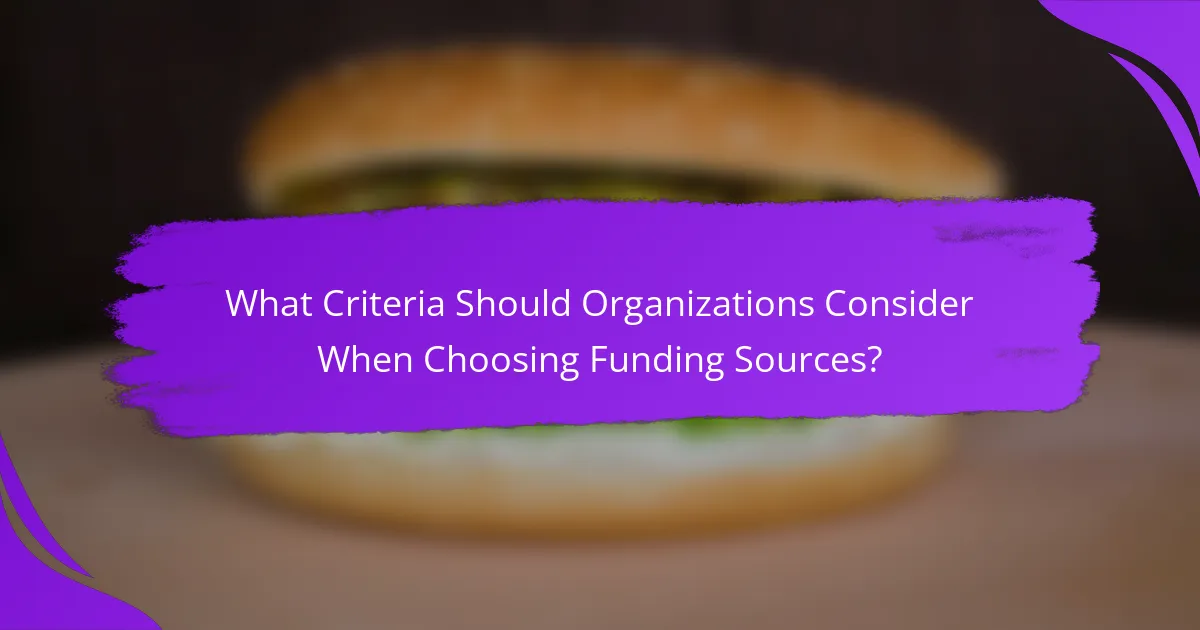
What Criteria Should Organizations Consider When Choosing Funding Sources?
Organizations should evaluate several key criteria when selecting funding sources, including alignment with their mission, the amount and duration of funding, and the potential for long-term partnerships. These factors can significantly influence the sustainability and effectiveness of global justice initiatives.
Alignment with Mission and Values
Ensuring that funding sources align with an organization’s mission and values is crucial for maintaining integrity and focus. Funders who share similar goals can provide not only financial support but also strategic guidance and credibility. For example, an organization focused on human rights may prioritize grants from foundations that specifically advocate for social justice.
Consider conducting a thorough assessment of potential funders to determine their priorities and past funding history. This can help identify those whose missions resonate with your own, thereby fostering a more authentic partnership.
Funding Amount and Duration
The funding amount and duration are vital considerations that can impact project scope and sustainability. Organizations should assess whether the financial support meets their operational needs and whether it is a one-time grant or a multi-year commitment. For instance, a project requiring substantial resources may benefit from a long-term funding agreement, while smaller initiatives might only need short-term support.
When evaluating funding options, create a budget that outlines expected costs and potential funding gaps. This will help in negotiating with funders and ensuring that the financial terms align with project goals. Aim for a balance between securing adequate funding and maintaining flexibility to adapt to changing circumstances.
